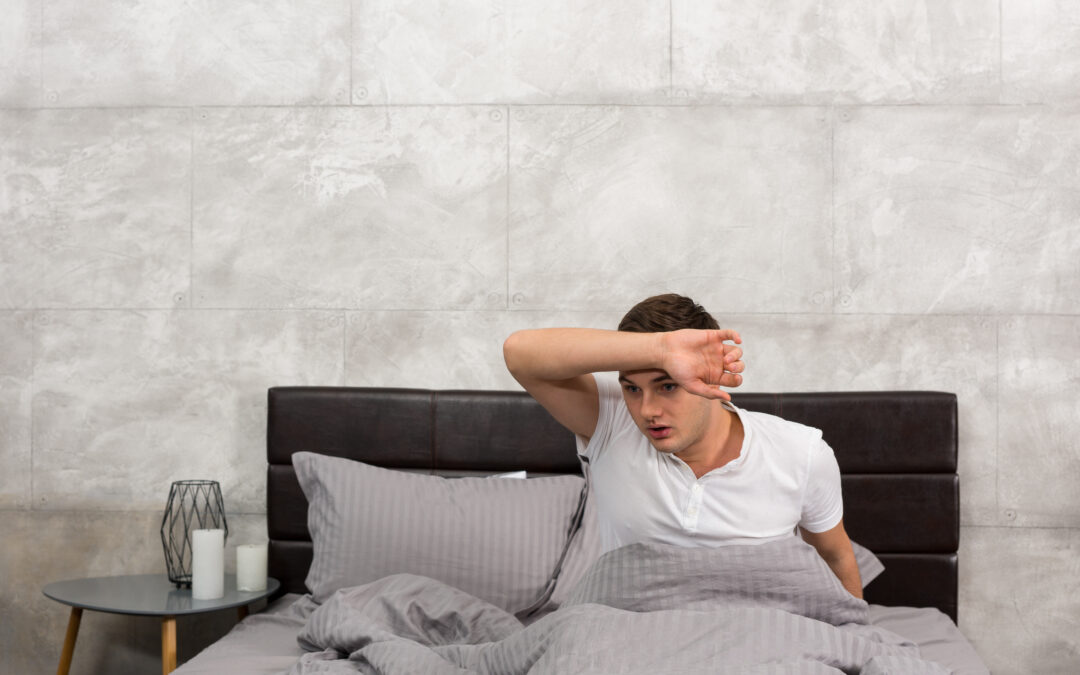Sudden Night Sweats
Experiencing sudden night sweats is not uncommon. Some people sweat a little and some quite a lot depending on several different factors: temperature of the room, the number of blankets you sleep with, the type of bedding you use, and even your diet can play a part!
Body sweats at night can be caused by many things. Most are not too serious, but in some cases, night sweats can indicate a serious medical condition. If you find that you sweat profusely during the night––enough that it wakes you up to soaked pajamas and damp sheets––there could be an underlying problem, so you should see your doctor or sleep specialist.
What Causes Night Sweats?
According to Healthline, determining the cause of heavy sweating in sleep can be tricky as each individual is different. Fortunately, every potential cause has its own symptoms that you might experience alongside sudden night sweats that should help narrow down the possibilities.
Less Concerning Causes for Body Sweats at Night
- Stress & Anxiety – Both stress and anxiety are mental health issues that often involve physical symptoms as well. Some associated problems include:
- Recurring feelings of worry, dread, and fear
- Difficulty focusing on anything besides these feelings
- Uncomfortable/unpleasant dreams and insomnia
- Digestive trouble
- Unexplained aches, pains, or muscle tension
- Irritability and mood instability
- Feelings of weakness and lethargy
- Gastroesophageal Reflux Disease (GERD) – You can experience GERD symptoms at any time of the day. However, many problems tend to flare up at night due to body position, and the food we’ve consumed before laying down. In addition to heavy sweating in sleep, GERD symptoms can include:
- Heartburn, chest pain, or esophageal spasms
- Regurgitation and issues with swallowing
- Sleep issues/insomnia
- Respiratory problems
- Hormonal Issues/Changes – There is a range of hormonal issues and disorders that can contribute to heavy sweating in sleep, including menopause, hyperthyroidism, and low testosterone. Some general symptoms include:
- Unexplained changes in weight
- Fluctuating energy levels
- Frequent headaches
- Sexual dysfunction
- Menstrual changes
- Medication – Taking certain medications can cause sudden night sweats as the primary side effect, including:
- Steroids (i.e., prednisone, cortisone)
- Antidepressants (SSRI)
- Pain relief medication (i.e., aspirin, acetaminophen)
- Diabetic medicines for lowering blood sugar
- Hormone therapy medicines
- Antipsychotics
More Concerning Causes for Body Sweats at Night
- Sleep Apnea – Sleep apnea is a severe condition in which you stop breathing during sleep several times a night, and it’s not unusual to experience sudden night sweats alongside it. Some other symptoms include:
- Daytime tiredness
- Restlessness, frequent waking through the night
- Wake up struggling to breathe
- Difficulty focusing during the day
- Frequent headaches
- Waking with a sore throat
- Anxiety or depression symptoms
- Infection – Some serious infections that also cause heavy sweating in sleep include tuberculosis, osteomyelitis, endocarditis, HIV, and some tick-borne diseases. The symptoms will often be flu-like:
- Chills and fever
- Body pain, aching joints, and muscles
- Weakness and fatigue
- Weight loss, lack of appetite
Tips for Combatting Heavy Sweating in Sleep
- Change Your Bedding: Regularly replace plush or heavy blankets with more breathable bedding, especially as seasons change. Sleep under light layers, try out moisture-wicking sheets and turn your pillow often.
- Calming Routine: Try and establish a calming nighttime routine. Reading, meditation, yoga, anything you need to help you wind down and eliminate stress before bedtime.
- Open a Window: Find a cost-effective way to keep your room at a comfortable temperature, which should be cooler at night than during the daytime. Crack a window, turn the thermostat down or try using a bedside fan.
- Ice Water: Put a cool glass of ice water on your bedside table. Drinking cold water when thirsty throughout the night can help you cool down if you wake up sweating and help keep you hydrated.
- Ice Pack: Sometimes, placing an ice pack under your pillow can help keep you cool while sleeping. Additionally, try placing a cool washcloth over your face before bed/during the night.
- Adjust Exercise Schedule: Physical activity works as a stimulant, and exercising right before bed can keep you tossing, turning, and sweating at night. In contrast, exercising during the day can instead help you feel more restful at night.
- Shower: Take a cool shower before bed. Not only does this cool you down, but it can help you feel refreshed and help you wind down.
- Eliminate Triggers: Avoid smoking cigarettes, using tobacco and other substances, drinking alcohol or caffeine, consuming warm drinks, or eating spicy foods just before bedtime. Additionally, avoid wearing tight and restrictive clothing to bed. If in colder climates, wear layers that you can peel off as you become warmer through the night.
If you experience difficulty sleeping, body sweats at night, or have other concerning symptoms, it’s best to check in with your healthcare provider and sleep specialist to get to the bottom of it and develop a treatment plan that best suits your needs.


